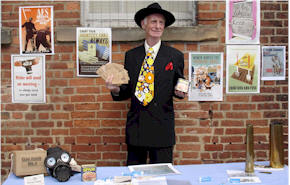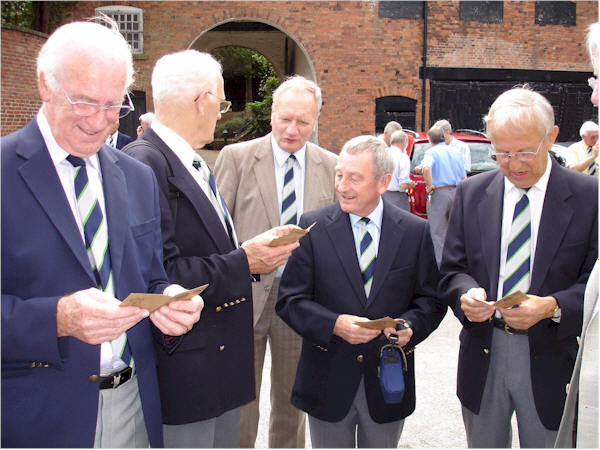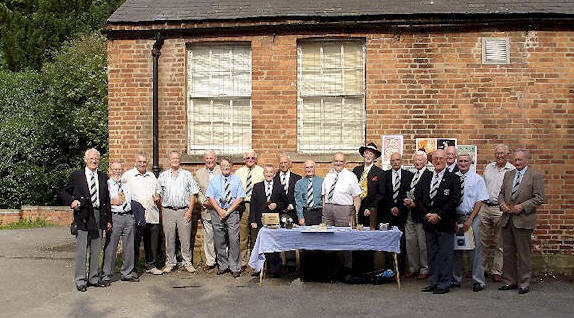
|
|
1940s: Centaurs obey call to carry their ID cards ALWAYS...With a little help |
| Sixty years on, we stood at the door of our old Central School form room in Darley Abbey, obeying the wartime injunction, Carry Your Identity Card ALWAYS. Inside, the 1940s came alive once more to the music of ‘Coming In On a Wing and a Prayer’. For some of us the landing was a close call. Former Telegraph journalist and Old Centaur John Garratt describes the latest reunion of his wartime classmates which this year received Prime Minister Tony Blair’s seal of approval. |
 THE
directive that dropped through the doors of Old Centaurs across the
country was couched in the solemn language of a national emergency. It
demonstrated all the power and authority of the “Government of the day”
and placed us on an immediate wartime footing. THE
directive that dropped through the doors of Old Centaurs across the
country was couched in the solemn language of a national emergency. It
demonstrated all the power and authority of the “Government of the day”
and placed us on an immediate wartime footing.
MR FIXIT: From shell cases to Spam, 1940s’ wide boy Vernon Tomlinson can fix it all – at a price! |
| Indeed, it gave me the
biggest thrill since my mother burst into my bedroom at the height of
the Suez Crisis 50 years ago, brandishing a buff envelope bearing the
ominous legend OHMS.
Few of the 1944-49 generation of Derby Central School boys fail to respond to the word of command. We have had a lifetime of practice. During the war we obeyed anybody with the slightest claim to authority, from the air raid warden down. We grovelled before shopkeepers, stood in endless queues while our mams worked in munitions factories, dug the school allotment, ate all our potato skins and bread crusts and bathed – when we had to – in five inches of water. It was a tough war on the Home Front but it schooled us in obedience and discipline. So, when Old Centaurs organiser Brian Skeldon decided to beef up security by re-introducing identity cards four years ahead of the Government timetable, his authority went unquestioned. In an Order of the Day, stark in its reminder of wartime restrictions and rationing, Brian dropped a bombshell on all Old Centaurs planning to attend the ninth annual class reunion at Darley Park.
“A requirement to access the food of the day,” he stated, “will be to produce your National Registration Identity Card, as issued by HM Government. “Clearly,” he added ominously, “not everyone has taken great care of this item or reported the fact that it is missing to the police. ” Brian’s demand sent Old Centaurs scrambling into attics, basements and garages, rifling battered suitcases, worn-out wallets and ancient albums in the hunt to retrieve these precious pieces of cardboard, first issued by the National Registration Office on the outbreak of war in 1939. A few, still obedient to the decree of 67 years ago, went unhesitatingly to their cache of important family documents and instantly produced their wartime bona fides. They had followed the emergency instructions to the letter: “This identity card must be carefully preserved. You must not lose it or allow it to be stolen. You must not allow it to pass into the hands of unauthorised persons or strangers.” For the rest of us, the slovenly minority, being without papers was a ticklish business – a great deal worse than careless talk, failing to report suspicious strangers or not carrying your gas mask – and it meant a walk on the shady side of wartime Britain. In the dark corners of a nation where everything was in short supply, there was always somebody who could fix it – from nylons and clothing coupons to petrol and identity cards. He was both the scrounger and the provider – the dealer on the black market. In time, he evolved into a chirpy Cockney character with a flash suit, padded shoulders and a rakish trilby. He was the spiv. He became an almost lovable rogue and into this role stepped old boy Vernon Tomlinson, the epitome of the wartime wide boy, to give our reunion a slice of 40s realism. Vernon made his entrance displaying a deck of identity cards and an armful of wrist watches. His fold-away table, designed for a quick exit, was set up in the ancient courtyard at Darley where Georgian society once took sedately to horse and where Vernon now laboured, sweating like a navvy under a hot sun, a thick double-breasted pinstripe suit and a non-stop line in sales patter. It was a masterly performance that would have earned him a standing ovation at any of our school concerts. His black market selection of highly prized contraband – all from the war-time horde of his chums – included nylons, ration books, identity cards, shell cases, shrapnel, gas masks, chewing gum, petrol coupons and even tins of Spam.
There is not a great demand for shell cases and gas masks in the Britain of 2006 and shrapnel no longer has the pulling power for a great schoolboy swap. But the unglamorous women at war, who followed the fashion diktats of Mrs Sew and Sew to Make Do and Mend, would have killed for a pair of stockings. Even today the very word “nylons” has a mystique all of its own for ladies of a certain generation. The passing trade immediately recognised Vernon’s 1940s persona and hardly needed his blandishments. “I know who you are, luv. You’re Arthur English. Ain’t you handsome.” Vernon, hugely flattered, offered up his greatest prize. “’Ere y’are, darlin’, finest denier, all for you – and almost no strings attached.” “Ooooh, ducky, it’s 60 years since I had an offer like that. How many pairs have you got?” While Vernon continued to barter, the rest of us stepped out across the courtyard away from Tony Pitman’s classic wartime posters, variously exhorting us to take in evacuees, become a land girl, join the fire service or just keep our mouths shut. For the umpteenth time we crowded into our old form room where our hosts of the last nine years, Jill and Ken Gee, of Darley Park tea rooms, waited to serve up a feast that would have decimated our ration books. The atmosphere was alive with the unforgettable music of the 40s and, appropriately, we entered to the strains of Coming In On A Wing and A Prayer. For some of us, at any rate, the landing was a close call. We dined on chicken and salmon, sausages and eggs, meringue and gateau and almost everything denied to us in five years of war. It merited the solemn reminder of our school captain, Arnie Parr, that the weekly ration per person used to be: 2oz butter, 6oz cooking fat, 2oz tea, 2oz cheese, 4oz bacon and a small piece of meat priced 1s 2d (5½p). Food shortages were such that a new generation of “sons of the soil” emerged across Britain in response to the command Dig for Victory. Arnie recalls: “We all seemed to survive on potatoes grown in the back garden. Every lawn became a vegetable plot or was turned over to a chicken run. “We kept chickens for eggs and meat and fed them on potato peelings and bran. I can still smell the mixture which I took out every day to our pen.” Wartime slogans sprouted faster than our potato patches and cheerfully ignoring the dictum “Is Your Journey Really Necessary?”, the youngest and most travelled Old Centaur, John Christie Selvey, born Christmas Day 1933, again flew in from his home in Los Angeles. John, who has now racked up 60,000 air miles in pursuit of his old chums, had the privilege of giving the reunion address and inevitably our thoughts turned to absent friends. Sadly, year by year, our numbers diminish and the roll of honour lengthens. We now mourn the passing of Alan Short, of Allestree, a modest and endearing character who smiled his way through five years of school without making a single enemy. Typically, he never let on to his chums that he was seriously ill. I shared with Alan the wartime order and discipline at Firs Estate Junior School. When the sirens sounded, we rose from our desks and stood quietly, then on the command “Lead on”, we marched two-by-two into the playground and filed into the air-raid shelter. We listened to the bombers drone overhead while our teacher, the legendary Polly Reynolds, shouted jokes above the crump of gunfire. There was never any panic. It is a cherished memory from an era in which the summers were always golden and the winters crisp and white. We were forever hunting precious souvenirs as the skies rained death, destruction and debris. Derrick Jubb recalls a Sunday afternoon storm when lightning struck two barrage balloons near the Arboretum. As the flaming wreckage fell to the ground, Derrick raced from his home in Whitaker Street and salvaged a six-inch piece of rubber. As a swap it was worth far more than common old shrapnel And in a land of shortages, it was left to Don Lee to point out that, in wartime, everything had its uses. After one heavy raid, Don went into his garden in White Street, scooped up a huge piece of shrapnel and carried it indoors to his father. “Just the job,” said Don’s dad, “now I’ll stop that blasted door banging.” It was a triumph of English improvisation over German technology and as Churchill would undoubtedly have said: “Some door stopper!” |
 Left:
Old Boys share a moment with their ID Cards.
Left:
Old Boys share a moment with their ID Cards.